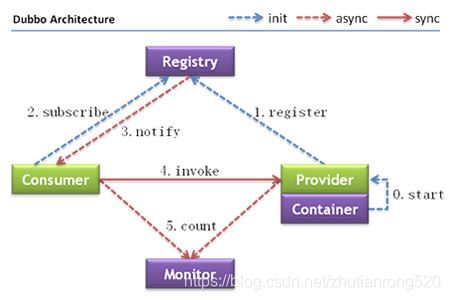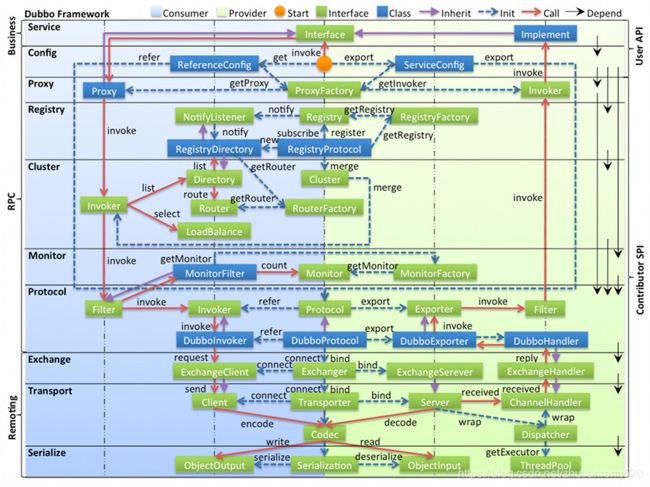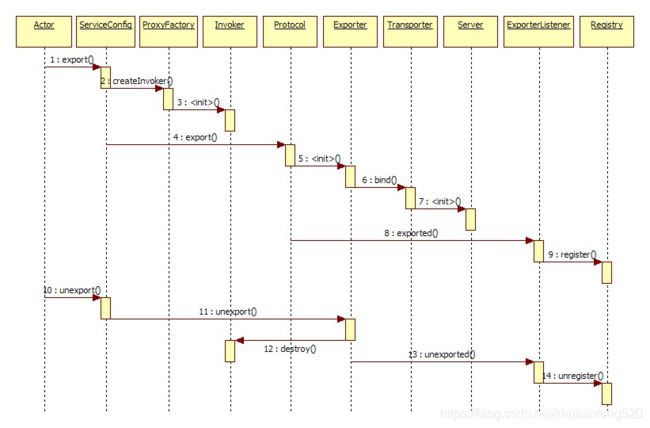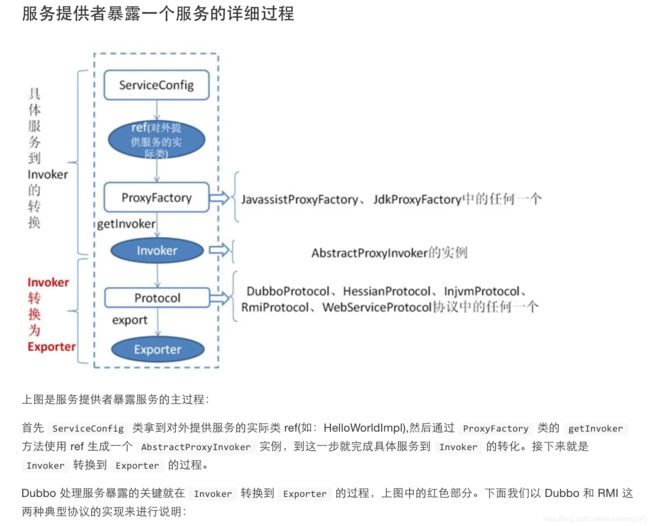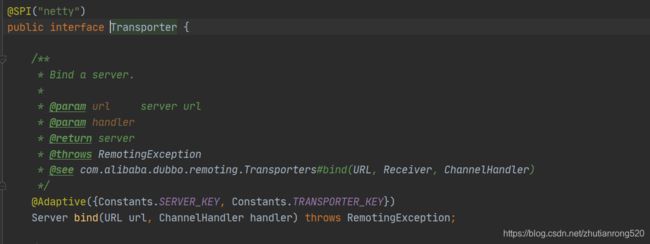dubbo启停原理解析以及服务暴露
一、dubbo的整体框架设计
以及暴露服务时序图:
二、原理和源码解析
2.1 标签解析
dubbo:service 标签会被解析成 ServiceBean。
ServiceBean 实现了 InitializingBean,在类加载完成之后会调用 afterPropertiesSet() 方法。在 afterPropertiesSet() 方法中,依次解析以下标签信息:
dubbo:provider
dubbo:application
dubbo:module
dubbo:registry
dubbo:monitor
dubbo:protocol
ServiceBean 还实现了 ApplicationListener,在 Spring 容器初始化的时候会调用 onApplicationEvent 方法。ServiceBean 重写了 onApplicationEvent 方法,实现了服务暴露的功能。
ServiceBean.java
public void onApplicationEvent(ContextRefreshedEvent event) {
if (!this.isExported() && !this.isUnexported()) {
if (logger.isInfoEnabled()) {
logger.info("The service ready on spring started. service: " + this.getInterface());
}
this.export();
}
}
2.2 延迟暴露
ServiceBean 扩展了 ServiceConfig,调用 export() 方法时由 ServiceConfig 完成服务暴露的功能实现。
ServiceConfig.java
public synchronized void export() {
if (provider != null) {
if (export == null) {
export = provider.getExport();
}
if (delay == null) {
delay = provider.getDelay();
}
}
if (export != null && !export) {
return;
}
if (delay != null && delay > 0) {
delayExportExecutor.schedule(new Runnable() {
@Override
public void run() {
doExport();
}
}, delay, TimeUnit.MILLISECONDS);
} else {
doExport();
}
}
2.3 参数检查
在 ServiceConfig 的 doExport() 方法中会进行参数检查和设置,包括:
- 泛化调用
- 本地实现
- 本地存根
- 本地伪装
配置(application、registry、protocol等)
ServiceConfig.java
protected synchronized void doExport() {
if (unexported) {
throw new IllegalStateException("Already unexported!");
}
if (exported) {
return;
}
exported = true;
if (interfaceName == null || interfaceName.length() == 0) {
throw new IllegalStateException("2.4 多协议、多注册中心
在检查完参数之后,开始暴露服务。Dubbo 支持多协议和多注册中心:
ServiceConfig.java
private void doExportUrls() {
List<URL> registryURLs = loadRegistries(true);
for (ProtocolConfig protocolConfig : protocols) {
doExportUrlsFor1Protocol(protocolConfig, registryURLs);
}
}
2.5 组装URL
针对每个协议、每个注册中心,开始组装 URL。
private void doExportUrlsFor1Protocol(ProtocolConfig protocolConfig, List<URL> registryURLs) {
String name = protocolConfig.getName();
if (name == null || name.length() == 0) {
name = "dubbo";
}
Map<String, String> map = new HashMap<String, String>();
map.put(Constants.SIDE_KEY, Constants.PROVIDER_SIDE);
map.put(Constants.DUBBO_VERSION_KEY, Version.getVersion());
map.put(Constants.TIMESTAMP_KEY, String.valueOf(System.currentTimeMillis()));
if (ConfigUtils.getPid() > 0) {
map.put(Constants.PID_KEY, String.valueOf(ConfigUtils.getPid()));
}
// 设置参数到map
appendParameters(map, application);
appendParameters(map, module);
appendParameters(map, provider, Constants.DEFAULT_KEY);
appendParameters(map, protocolConfig);
appendParameters(map, this);
if (methods != null && !methods.isEmpty()) {
for (MethodConfig method : methods) {
appendParameters(map, method, method.getName());
String retryKey = method.getName() + ".retry";
if (map.containsKey(retryKey)) {
String retryValue = map.remove(retryKey);
if ("false".equals(retryValue)) {
map.put(method.getName() + ".retries", "0");
}
}
List<ArgumentConfig> arguments = method.getArguments();
if (arguments != null && !arguments.isEmpty()) {
for (ArgumentConfig argument : arguments) {
// convert argument type
if (argument.getType() != null && argument.getType().length() > 0) {
Method[] methods = interfaceClass.getMethods();
// visit all methods
if (methods != null && methods.length > 0) {
for (int i = 0; i < methods.length; i++) {
String methodName = methods[i].getName();
// target the method, and get its signature
if (methodName.equals(method.getName())) {
Class<?>[] argtypes = methods[i].getParameterTypes();
// one callback in the method
if (argument.getIndex() != -1) {
if (argtypes[argument.getIndex()].getName().equals(argument.getType())) {
appendParameters(map, argument, method.getName() + "." + argument.getIndex());
} else {
throw new IllegalArgumentException("argument config error : the index attribute and type attribute not match :index :" + argument.getIndex() + ", type:" + argument.getType());
}
} else {
// multiple callbacks in the method
for (int j = 0; j < argtypes.length; j++) {
Class<?> argclazz = argtypes[j];
if (argclazz.getName().equals(argument.getType())) {
appendParameters(map, argument, method.getName() + "." + j);
if (argument.getIndex() != -1 && argument.getIndex() != j) {
throw new IllegalArgumentException("argument config error : the index attribute and type attribute not match :index :" + argument.getIndex() + ", type:" + argument.getType());
}
}
}
}
}
}
}
} else if (argument.getIndex() != -1) {
appendParameters(map, argument, method.getName() + "." + argument.getIndex());
} else {
throw new IllegalArgumentException("argument config must set index or type attribute.eg: 2.6 服务暴露
如果配置 scope=none, 则不会进行服务暴露;如果没有配置 scope 或者 scope=local,则会进行本地暴露。
ServiceConfig.java
private void doExportUrlsFor1Protocol(ProtocolConfig protocolConfig, List<URL> registryURLs) {
// .......
String scope = url.getParameter(Constants.SCOPE_KEY);
// don't export when none is configured 配置为none不暴露
if (!Constants.SCOPE_NONE.toString().equalsIgnoreCase(scope)) {
// export to local if the config is not remote (export to remote only when config is remote) 配置不是remote的情况下做本地暴露 (配置为remote,则表示只暴露远程服务)
if (!Constants.SCOPE_REMOTE.toString().equalsIgnoreCase(scope)) {
exportLocal(url);
}
// export to remote if the config is not local (export to local only when config is local)
if (!Constants.SCOPE_LOCAL.toString().equalsIgnoreCase(scope)) {
if (logger.isInfoEnabled()) {
logger.info("Export dubbo service " + interfaceClass.getName() + " to url " + url);
}
if (registryURLs != null && !registryURLs.isEmpty()) {
for (URL registryURL : registryURLs) {
url = url.addParameterIfAbsent(Constants.DYNAMIC_KEY, registryURL.getParameter(Constants.DYNAMIC_KEY));
URL monitorUrl = loadMonitor(registryURL);
if (monitorUrl != null) {
url = url.addParameterAndEncoded(Constants.MONITOR_KEY, monitorUrl.toFullString());
}
if (logger.isInfoEnabled()) {
logger.info("Register dubbo service " + interfaceClass.getName() + " url " + url + " to registry " + registryURL);
}
Invoker<?> invoker = proxyFactory.getInvoker(ref, (Class) interfaceClass, registryURL.addParameterAndEncoded(Constants.EXPORT_KEY, url.toFullString()));
DelegateProviderMetaDataInvoker wrapperInvoker = new DelegateProviderMetaDataInvoker(invoker, this);
Exporter<?> exporter = protocol.export(wrapperInvoker);
exporters.add(exporter);
}
} else {
Invoker<?> invoker = proxyFactory.getInvoker(ref, (Class) interfaceClass, url);
DelegateProviderMetaDataInvoker wrapperInvoker = new DelegateProviderMetaDataInvoker(invoker, this);
Exporter<?> exporter = protocol.export(wrapperInvoker);
exporters.add(exporter);
}
}
}
}
-
暴露服务的时候,会通过代理创建 Invoker;
-
本地暴露时使用 injvm 协议,injvm 协议是一个伪协议,它不开启端口,不能被远程调用,只在 JVM 内直接关联,但执行 Dubbo 的 Filter 链。
Invoker<?> invoker = proxyFactory.getInvoker(ref, (Class) interfaceClass, registryURL.addParameterAndEncoded(Constants.EXPORT_KEY, url.toFullString()));
DelegateProviderMetaDataInvoker wrapperInvoker = new DelegateProviderMetaDataInvoker(invoker, this);
Exporter<?> exporter = protocol.export(wrapperInvoker);
exporters.add(exporter);
// 暴露本地
private void exportLocal(URL url) {
if (!Constants.LOCAL_PROTOCOL.equalsIgnoreCase(url.getProtocol())) {
URL local = URL.valueOf(url.toFullString())
.setProtocol(Constants.LOCAL_PROTOCOL)
.setHost(LOCALHOST)
.setPort(0);
ServiceClassHolder.getInstance().pushServiceClass(getServiceClass(ref));
Exporter<?> exporter = protocol.export(
proxyFactory.getInvoker(ref, (Class) interfaceClass, local));
exporters.add(exporter);
logger.info("Export dubbo service " + interfaceClass.getName() + " to local registry");
}
}
2.7 暴露服务
不使用注册中心时,直接调用对应协议(如 Dubbo 协议)的 export() 暴露服务。以 Dubbo 协议为例:
DubboProtocol.java
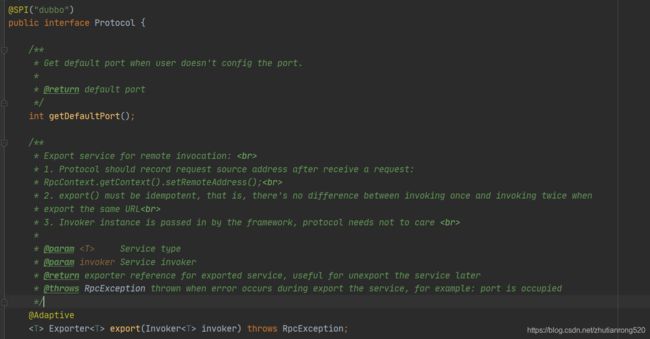
@Override
public <T> Exporter<T> export(Invoker<T> invoker) throws RpcException {
URL url = invoker.getUrl();
// export service.
String key = serviceKey(url);
DubboExporter<T> exporter = new DubboExporter<T>(invoker, key, exporterMap);
exporterMap.put(key, exporter);
//export an stub service for dispatching event
Boolean isStubSupportEvent = url.getParameter(Constants.STUB_EVENT_KEY, Constants.DEFAULT_STUB_EVENT);
Boolean isCallbackservice = url.getParameter(Constants.IS_CALLBACK_SERVICE, false);
if (isStubSupportEvent && !isCallbackservice) {
String stubServiceMethods = url.getParameter(Constants.STUB_EVENT_METHODS_KEY);
if (stubServiceMethods == null || stubServiceMethods.length() == 0) {
if (logger.isWarnEnabled()) {
logger.warn(new IllegalStateException("consumer [" + url.getParameter(Constants.INTERFACE_KEY) +
"], has set stubproxy support event ,but no stub methods founded."));
}
} else {
stubServiceMethodsMap.put(url.getServiceKey(), stubServiceMethods);
}
}
openServer(url);
optimizeSerialization(url);
return exporter;
}
调用 openServer() 方法创建并启动 Server:
private void openServer(URL url) {
// find server.
String key = url.getAddress();
//client can export a service which's only for server to invoke
boolean isServer = url.getParameter(Constants.IS_SERVER_KEY, true);
if (isServer) {
ExchangeServer server = serverMap.get(key);
if (server == null) {
serverMap.put(key, createServer(url));
} else {
// server supports reset, use together with override
server.reset(url);
}
}
}
private ExchangeServer createServer(URL url) {
// send readonly event when server closes, it's enabled by default
url = url.addParameterIfAbsent(Constants.CHANNEL_READONLYEVENT_SENT_KEY, Boolean.TRUE.toString());
// enable heartbeat by default
url = url.addParameterIfAbsent(Constants.HEARTBEAT_KEY, String.valueOf(Constants.DEFAULT_HEARTBEAT));
String str = url.getParameter(Constants.SERVER_KEY, Constants.DEFAULT_REMOTING_SERVER);
if (str != null && str.length() > 0 && !ExtensionLoader.getExtensionLoader(Transporter.class).hasExtension(str))
throw new RpcException("Unsupported server type: " + str + ", url: " + url);
url = url.addParameter(Constants.CODEC_KEY, DubboCodec.NAME);
ExchangeServer server;
try {
server = Exchangers.bind(url, requestHandler);
} catch (RemotingException e) {
throw new RpcException("Fail to start server(url: " + url + ") " + e.getMessage(), e);
}
str = url.getParameter(Constants.CLIENT_KEY);
if (str != null && str.length() > 0) {
Set<String> supportedTypes = ExtensionLoader.getExtensionLoader(Transporter.class).getSupportedExtensions();
if (!supportedTypes.contains(str)) {
throw new RpcException("Unsupported client type: " + str);
}
}
return server;
}
Transporters.java
2.8 服务注册
如果使用了注册中心,则在通过具体协议(如 Dubbo 协议)暴露服务之后(即在 2.8 基础之上)进入服务注册流程,将服务节点注册到注册中心。
@Override
public <T> Exporter<T> export(final Invoker<T> originInvoker) throws RpcException {
//export invoker
final ExporterChangeableWrapper<T> exporter = doLocalExport(originInvoker);
URL registryUrl = getRegistryUrl(originInvoker);
//registry provider
final Registry registry = getRegistry(originInvoker);
final URL registedProviderUrl = getRegistedProviderUrl(originInvoker);
//to judge to delay publish whether or not
boolean register = registedProviderUrl.getParameter("register", true);
ProviderConsumerRegTable.registerProvider(originInvoker, registryUrl, registedProviderUrl);
if (register) {
register(registryUrl, registedProviderUrl);
ProviderConsumerRegTable.getProviderWrapper(originInvoker).setReg(true);
}
// Subscribe the override data
// FIXME When the provider subscribes, it will affect the scene : a certain JVM exposes the service and call the same service. Because the subscribed is cached key with the name of the service, it causes the subscription information to cover.
final URL overrideSubscribeUrl = getSubscribedOverrideUrl(registedProviderUrl);
final OverrideListener overrideSubscribeListener = new OverrideListener(overrideSubscribeUrl, originInvoker);
overrideListeners.put(overrideSubscribeUrl, overrideSubscribeListener);
registry.subscribe(overrideSubscribeUrl, overrideSubscribeListener);
//Ensure that a new exporter instance is returned every time export
return new DestroyableExporter<T>(exporter, originInvoker, overrideSubscribeUrl, registedProviderUrl);
}
getRegistry() 方法根据注册中心类型(默认 Zookeeper)获取注册中心客户端,由注册中心客户端实例来进行真正的服务注册。
注册中心客户端将节点注册到注册中心,同时订阅对应的 override 数据,实时监听服务的属性变动实现动态配置功能。
最终返回的 Exporter 实现了 unexport() 方法,这样在服务下线时清理相关资源。
